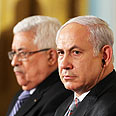
If the Israelis and the Palestinians indeed restart peace talks in the coming days, as announced by US Secretary of State John Kerry, they would face the same array of problems that have confounded progress in years of on-off talks.
The key issues in the talks pertain to borders, security, settlements, the status of Jerusalem and of refugees.
Related stories:
- EU backs resumption of peace talks
- MK Tibi warns of intifada if talks fail
- Israeli ministers divided over peace talks' chances
Borders
The Palestinians want to create an independent state in the West Bank and the Gaza Strip, with Arab east Jerusalem as their capital – land Israel seized in the 1967 Middle East war.
Palestinian President Mahmoud Abbas is expected to demand the opening point of the negotiations to be the understanding he has reached with former Prime Minister Ehud Olmert, which include transferring lands in the Afula area, in the Judean Desert and near the Gaza Strip into Palestinian hands, as compensation for letting Israel keep settlement blocs.
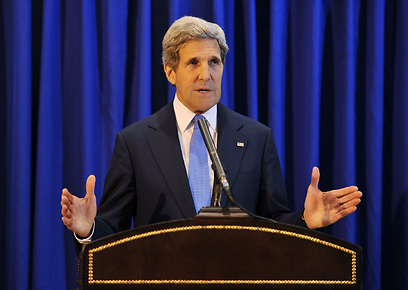
Kerry announces talks resumption (Photo: Gettyimages)
A similar outline also arose in the course of the negotiations between Yasser Arafat and Ehud Barak .
Israeli Prime Minister Benjamin Netanyahu has resisted calls for talks to be based on the pre-war 1967 lines, saying the shape of any Palestinian state must be decided in the negotiations.
Many right-wingers in Netanyahu's own cabinet have strongly rejected the notion of returning to the 1967 lines, claiming biblical Jewish birthright to all the land from the Mediterranean sea to the river Jordan, and also citing the security risks these borders pose for Israel.
Adding to the complications, the Palestinians are deeply divided, with Gaza and the West Bank run by different parties that are virulently opposed to each other. Hamas Islamists, who govern Gaza, denounce the notion of direct talks and do not recognize Israel's right to exist.
Security
Netanyahu's statements on the security arrangements with the future Palestinian state are uncompromising: Palestine must be demilitarized and it will not be allowed heavy weapons such as missiles, rockets or tanks.
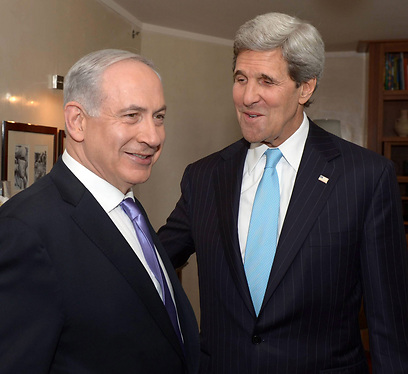
Kerry and Netanyahu (Photo: EPA)
Netanyahu will also demand the Palestinian state's airspace be under Israeli control.
According to his previous statements, without these conditions the Palestinian state will emerge as a threat similar to the Gaza Strip, a possibility Israel cannot abide.
Netanyahu also announced Israel needs "defensible borders," and is expected to demand continued IDF presence along the Jordan Valley.
These demands have been part of the Israeli stance since the Oslo Accords . The Palestinians have not objected to demilitarization or to Israeli control over the airspace, but they are expected to oppose Israeli military presence in their territory, including the Jordan Valley.
Israeli settlements
Israel has built extensive settlements in the West Bank and East Jerusalem, creating homes for half a million Jews. Palestinian President Mahmoud Abbas has repeatedly called for a total freeze of their expansion during any talks - an issue that caused the collapse of the last negotiations in 2010.
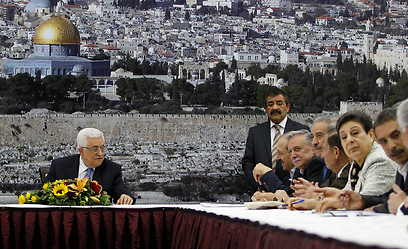
Abbas and PLO's executive committee (Photo: Reuters)
Palestinians say the settlements, deemed illegal by the World Court, should be evacuated, but have left open the door for some land swaps to enable some blocs to remain in Israeli hands, though the sides are divided on the limits of these blocs, with contested areas in eastern Gush Etzion and settlements north of Ariel.
However, under any deal, some settlements would surely find themselves within a Palestinian state, which some rightist and national religious Israeli parties would find intolerable.
Jerusalem
The status of Jerusalem is potentially the toughest issue to resolve. The Palestinians want East Jerusalem, which includes the Old City, with sites sacred to Muslims, Jews and Christians, to be their capital. Netanyahu has said Jerusalem must remain Israel's "indivisible and eternal" capital and has broad political backing within Israel for the demand. Unlike the West Bank, Israel has annexed Jerusalem, a move that has not been recognized internationally. Numerous Jewish settlements across the east of the city complicate any territorial division.
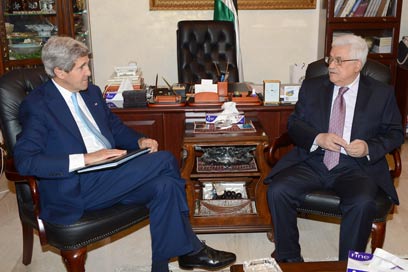
Kerry and Abbas in Jordan (Photo: Gettyimages)
However, in talks with Olmert, Abbas did not reject the possibility that the Old City and its immediate surroundings be under international supervision, and not under either sides' sovereignty.
Refugees
Palestinians have long demanded that refugees who fled or were forced to leave in the war of Israel's creation in 1948 should be allowed to return, along with millions of their descendants, currently living in camps dotted around neighboring states and in the West Bank and Gaza.
Israel has rejected this, fearing such an influx could jeopardize the Jewish majority in Israel. Palestinian negotiators have signaled in the past that they would accept "a just and agreed-upon" solution for refugees as laid out in a UN resolution that mentions compensation for those who settle elsewhere.
Abbas, born in Safed, is himself a refugee, and has admitted this year that he has realized that he will not return to his family home in the northern city.
At the same event, he also noted that the territories acquired by Israel in the 1948 war belong to Israel, and not to Palestine.
Beyond these core issues, other preconditions have surfaced that may prove as deal breakers: Netanyahu has reiterated his demand for Palestine to recognize Israel as a Jewish state as a precondition to negotiations, and the Palestinians have demanded a complete settlement construction freeze, similar to the one in 2009.
Currently it is unclear whether any understandings have been reached on these issues, and this ambiguousness is expected to stay – as US State Secretary John Kerry clarified in his announcement of the resumption of talks, a strategy of confidentiality may prove to be the negotiations' success.
Itamar Fleishman contributed to this report
- Receive Ynetnews updates
directly to your desktop















